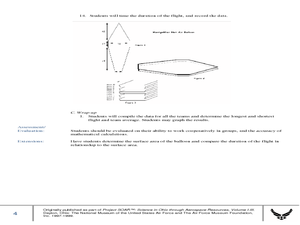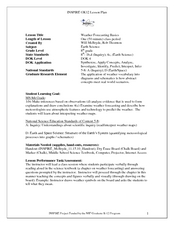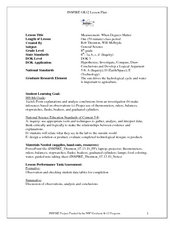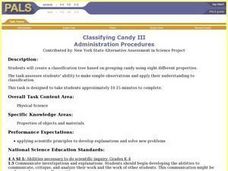Curated OER
Rock Identification Lab
Eighth graders compare and contrast the three different types of rock. In this earth science lesson, 8th graders classify rock samples according to their correct rock type. They design their own data collection table.
Curated OER
Up, Up and Away with the Montgolfier Balloon
Young scholars construct hot air balloons. For this science lesson, students assemble their own balloon using tissue paper and glue. They time the duration of the flight, record data and calculate team averages.
Curated OER
Subject Selection in Clinical Trials
Students design and conduct an experiment to test a hypothesis. They create a question/objective based on the results of their experiment that can be answered by performing a human clinical trial. Students write inclusion and exclusion...
Curated OER
Fun with Balloons
Fifth graders design their own hot air balloon. In this science lesson, 5th graders investigate how factors like weight and sizes affect a balloon's lifting power. They also write math problems based on facts written in the book "The...
Curated OER
Earth History Part II
Eighth graders hypothesize what caused the break up of continents. In this earth science lesson, 8th graders study about the events that took place during Mesozoic and Cenozoic Era. They reconstruct a supercontinent and report their...
Curated OER
Weather Instrument Use and Application
Eighth graders measure temperature, wind speed and pressure using Skymaster SM-28. In this earth science lesson, 8th graders collect data and record observations taken from outdoors. They explain why numerical values are different in...
Curated OER
Cycles Review
Eighth graders discuss the four major cycles of matter. For this general science lesson, 8th graders decide which of the four is the most important. They share their opinion in class.
Curated OER
Insect Classification
Students compare and contrast the visible structures of three insects based on photographs. They differentiate characteristics of crane flies, ants, and wasps then create a simple classification system.
Curated OER
Introduction to Biomes
Eighth graders identify the different kinds of biomes. In this life science instructional activity, 8th graders explain their importance in an ecosystem. They take a BrainPop quiz at the end of the instructional activity..
Curated OER
Mineral Lab
Eighth graders examine the physical properties of different minerals. In this earth science lesson, 8th graders explain the uses of minerals in their daily lives. They complete the mineral identification table during the lesson.
Curated OER
Weather Forecasting Basics
Eighth graders analyze weather diagrams and weather maps. In this earth science instructional activity, 8th graders explain why it is important to know the weather. They complete a handout at the end of the instructional activity.
Curated OER
Who Wants to be a Cellular Biologist?
Eighth graders review concepts in cellular biology. In this biology lesson, 8th graders play an interactive game based on the idea of winning money. They discuss misconceptions about the topic.
Curated OER
Our Food and Microorganisms
Students answer questions about how microorganisms can affect our food supply and how they can be controlled. The first set of inquiry activities are directed by the teacher. Subsequent activities are based on students generating their...
Curated OER
Electrical Engineers for a Day
High schoolers build a robot out of a 3-¿¿ inch floppy disk drive, two floppy disks, and some other miscellaneous supplies. They apply information they gather about electrical circuits from a web-based circuit design program.
Curated OER
The Mysteries of Saturn and Cassini
Students examine photographs of Saturn and make observations. They develop questions they have based on viewing the photos. They work together to answer their questions.
Curated OER
pH Readings and Salinity Readings of Water From Three Locations Within the Neponset River Watershed
Sixth graders test the ph levels of water from three different water environments within the Neponset River Watershed. They discuss the three different water environments, take pH measurements of the three samples, and predict which...
Curated OER
Measurement: When Degrees Matter
Eighth graders record the temperature change of the beakers. In this general science lesson, 8th graders create their own data table for recording observations. They discuss experimental results and cite real life applications.
Curated OER
Weather Elements and Instruments
Eighth graders identify the different weather elements. In this earth science lesson, 8th graders explain the difference between relative humidity and dew point. They discuss the different instruments used to predict weather.
Curated OER
Student Guide: Evolution Videodisk from Videodiscovery
Students use this worksheet with the videodisk from Video discovery titled Evolution: Inquiries into Biology and Earth Science.Written because there is no computerized control program available, it is to be used with a standard videodisk...
Curated OER
Pesticide Prevalence
Young scholars investigate the prevalence of pesticides in their communities by
searching their homes, visiting local stores and talking to extended family and friends. They conduct their search by classifying pesticides based on the...
Curated OER
Classifying Candy III
Students create a classification tree based on grouping candy with eight different properties. This allows students to understand how living things are classified.
Curated OER
Sticky Tongue
Third graders make inquiry about the adaptations that help a frog to survive in its environment. They identify the adaptations and define how they work. They also research the idea of how species have common characteristics.
Curated OER
Virial Theorem Lesson
Ninth graders describe how equilibrium can occur as the balance of two effects. They model the stability of elliptical galaxies based on how fast stars within the galaxy are moving.
Curated OER
Insect Matching
Third graders match insects to the proper order based on the characteristics. They culminate their study of the orders that insects belong in by looking at insects with magnifying glasses.
Other popular searches
- Inquiry Based Science
- Inquiry Based Science
- Inquiry Based Science Lessons
- Inquiry Based Science Water
- Inquiry Based Learning Science
- Inquiry Based Life Science
- Inquiry Based Science Lessons
- Inquiry Based Science Sose
- Inquiry Based Science Souse
- Inquiry Based Physics Science

























